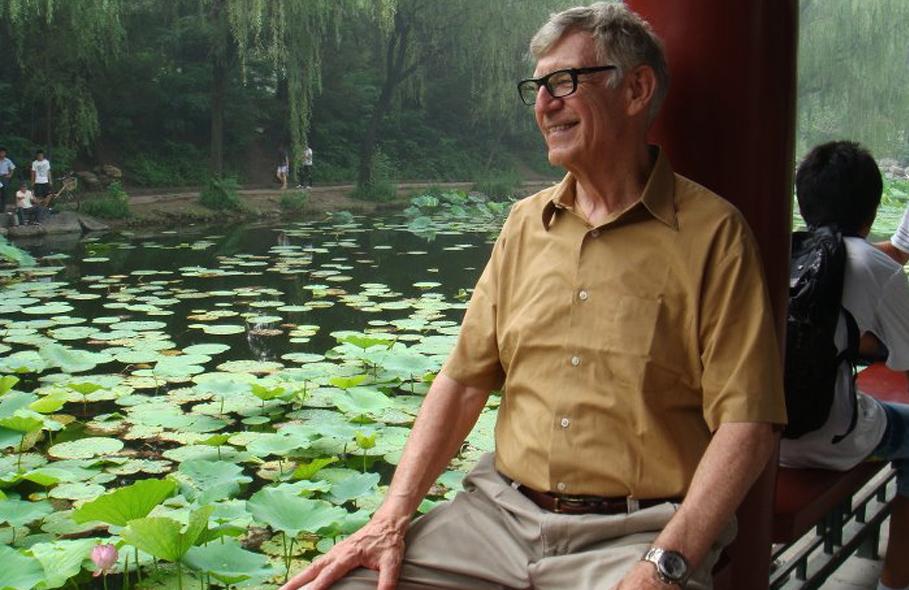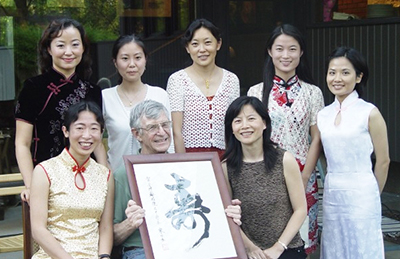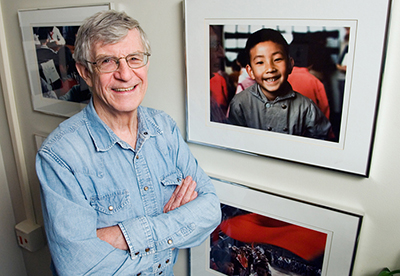Richard Anderson: Redefining Literacy Education
by Tom Hanlon / Apr 29, 2019

At the age of 85, Richard Anderson is still highly motivated—and highly productive—in his work as a professor emeritus of educational psychology at the University of Illinois.
In addition to his seminal work that has shaped and redefined literacy education, Richard Anderson has done his part to redefine the concept of retirement.
Anderson officially retired in 2010 after 47 years of fruitful labor as a professor in the College of Education’s educational psychology department at the University of Illinois at Urbana-Champaign.
But he didn’t stop working.
Now 85 and a professor emeritus, Anderson still comes in to work every day. He has projects to tend to, papers to write, and one last—perhaps one last—PhD student to mentor.
Sixty-six students have earned their PhDs under Anderson, with one to go. “She’ll probably be my last,” he says. “But who knows? I may still be raring to go at 95.”
Asked about true retirement—one involving no work—Anderson laughs. “I have no plans to retire. I imagine they’ll carry me out in a pine box.”
Staying Power
In baseball, some pitchers are starters, those who begin the game; others are closers, those who are counted on to finish a game and nail down the victory.
Looking back over Dick Anderson’s long and storied career as an educational psychologist, he is the rarest of commodities: he is both a starter and a closer.
He is the patriarch of the National Consortium for Instruction and Cognition, which was started in in 1969 by several of his graduate students. It is still going strong, holding an annual conference that includes six generations of academics (his students, the students of his students, and four more generations beyond that).
He played an influential role in starting the Center for the Study of Reading (CSR) in 1976. The CSR continues to produce impactful research in reaching children who are failing to read, helping children acquire knowledge from and reason about the written word, and improving the education of reading teachers.
 He led a US delegation to China in 1984. The trip, coming eight years after the Cultural Revolution ended, was sponsored by the US Department of Education and the Chinese Ministry of Education. He has continued his work in that country, starting a Shared-Book reading program that began in urban centers (about one million children per year are involved in the program) and is reaching out now into rural areas through Sunglory Education of Beijing, China, a publishing company that he helped to start to achieve that goal.
He led a US delegation to China in 1984. The trip, coming eight years after the Cultural Revolution ended, was sponsored by the US Department of Education and the Chinese Ministry of Education. He has continued his work in that country, starting a Shared-Book reading program that began in urban centers (about one million children per year are involved in the program) and is reaching out now into rural areas through Sunglory Education of Beijing, China, a publishing company that he helped to start to achieve that goal.
Impact in Multiple Areas
The National Consortium for Instruction and Cognition (NCIC) is celebrating its 50th anniversary this fall. Over 400 people have been part of the NCIC. Anderson jokes that “It’s an excuse for a party,” but then adds that the mentoring that has taken place across the academic generations through the NCIC is something the organization is very proud of. “As far as we know, no other organization in a field of academic study has met annually for 50 years and has elected officers, endowments, research programs and fellowships, and travel grants.”
 As for the Center for the Study of Reading, Anderson says while it’s hard to document “on-the-ground influence,” the Center has definitely influenced the professors who train teachers. “Our book, Becoming a Nation of Readers, is perhaps the most widely read book of all time in the field of literacy,” he says. “It has been highly influential in shaping reading instruction throughout the country.”
As for the Center for the Study of Reading, Anderson says while it’s hard to document “on-the-ground influence,” the Center has definitely influenced the professors who train teachers. “Our book, Becoming a Nation of Readers, is perhaps the most widely read book of all time in the field of literacy,” he says. “It has been highly influential in shaping reading instruction throughout the country.”
The CSR has produced about 700 reports—“most of which were published as journal articles or book chapters over a 15-year period”—and also produced a video series, Teaching Reading: Strategies from Successful Classrooms, that has been a long-time essential resource for educators. “It’s probably been in all, or almost all, teacher education programs in the US,” Anderson notes.
Regarding his work in China, and in particular his work with the Shared-Book reading program, “We’ve wanted to work with poor children from the countryside ever since we founded the program,” Anderson says. “But that hasn’t been economically and politically viable.” So, he and his Chinese colleagues, led by his first Chinese student, Shu Hua, solved that problem by garnering support from the Chinese Ministry of Education and the Ford Foundation. About 8,000 rural children have taken part in the program so far.
When Anderson starts something, he stays with it. Fifty-six years with the University of Illinois. Forty-three years as director of the CSR. Fifty years as director of the NCIC. Thirty-five years in working with a growing legion of Chinese academics to foster reading literacy in China.
And when he comes upon a roadblock, as he did with the Shared-Book reading program in China’s rural areas, he finds a way around it.
Arrival on Campus
Anderson arrived on the University of Illinois campus in 1963. Armed with bachelor’s, master’s, and doctoral degrees from Harvard, he taught junior high and high school and later worked as a school administrator in East Brunswick, New Jersey, for three years before taking a one-year, soft-money position as coordinator of a graduate program in educational psychology at Illinois.
The soft money turned hard, and one year turned into 47 (56, if you’re counting the nine years he’s worked since he “retired”). After four years he was made a full professor with a joint appointment in psychology and educational psychology.
“The rest is history,” he says.
Making history is appropriate for Anderson. He was the first from River Falls, Wisconsin, to attend Harvard (he calls River Falls “the idyllic Saturday Evening Post town”). And his bachelor’s degree is in history. It was a talk given by the associate dean in the Harvard Graduate School of Education that steered the soon-to-be graduate toward a master’s in social science education. And it was in his first year as a teacher that he realized “There was no scientific knowledge behind how we were teaching, and I figured we’d better fix that.”
That experience and understanding led to his doctorate in educational psychology, which he attained in 1960.
From there, he took up the challenge of discovering how to “fix” problems in education, creating resources, tools, and programs to help teachers guide students in developing intellectually and socially. And that work has made his last 56 years fly by.
A Large “Extended Family”
“I’ve loved being a teacher and mentor,” Anderson says. “And having this network of former Chinese students. I love these young people. Though some aren’t so young anymore. My first generation of students is already retired.” It’s been very satisfying, he says, to continue to meet with and in some cases collaborate with people over many years, sometimes decades.
Asked to name his top contributions to the field over those decades, Anderson thinks a moment before answering. “We made important contributions to understanding reading comprehension,” he replies. “And we made important contributions with our colleagues to children’s understanding of words and their meanings. And to understanding to read Chinese. And we made important contributions to the understanding of the role of classroom discussion in children’s social and cognitive growth.”
 His contributions aren’t finished. He is still working on two projects, one exploring how cognitive growth happens for African American and Hispanic American children in low-income schools (“We’ve just gotten two big papers completed on this study”), the other an emergent literacy program that uses a literature-based approach to early literacy. This latter work is taking place in what seems to be his home away from home: China. He has been a professor at Beijing Normal University since 2003, served as university chair professor at National Taiwan University for two years, and had an appointment at The Hong Kong Polytechnic University.
His contributions aren’t finished. He is still working on two projects, one exploring how cognitive growth happens for African American and Hispanic American children in low-income schools (“We’ve just gotten two big papers completed on this study”), the other an emergent literacy program that uses a literature-based approach to early literacy. This latter work is taking place in what seems to be his home away from home: China. He has been a professor at Beijing Normal University since 2003, served as university chair professor at National Taiwan University for two years, and had an appointment at The Hong Kong Polytechnic University.
“To have a really long career, it’s not enough to just be smart and hardworking,” Anderson says. “There’s got to be something that gives you a kick, that keeps you wanting to do it. For me, it’s the human side of my work. It’s very satisfying to work with good friends with whom you have mutual respect and with whom can do things that are scientifically important for your field and that are important for children’s welfare. That’s deeply satisfying.”
Anderson also draws satisfaction from seeing his PhD students emerge as competent scholars. “It’s like teaching a child to ride a bicycle,” he says. “They might not be perfect at it yet, but soon they can manage to ride 100 yards without falling down or crashing into something. We can see that same thing at a more mature level with PhD students. It’s quite exciting when you see them come up with great ideas about how to solve a problem and have the intellectual tools to do so.”
Anderson has six children, 11 grandchildren, and two great-grandchildren. “But I consider my PhD students as academic children, grandchildren, and great-grandchildren, too,” he says. “They are my extended family.”
Ever Busy
When Dick Anderson pushes away from his office desk, he doesn’t head for his recliner. “I’m a physical fitness nut,” he says. “I go to the gym every day. I alternate weightlifting with aerobics.” For his cardio work, he doesn’t just take it easy, either. He does HIIT (high intensity interval training) workouts on an elliptical machine or exercise bike. “And in the summers, I hike and go out in my kayak every day. In the winters, I can still cross-country ski.”
Perhaps one day he will learn the meaning of the words slow down. Just don't count on it.